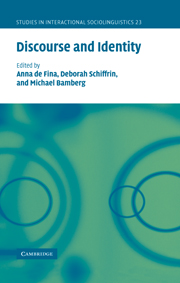Book contents
- Frontmatter
- Contents
- List of contributors
- Introduction
- Part I Overview: theory, method and analysis
- Part II Private and public identities: constructing who we are
- Part III The gendered self: becoming and being a man
- Part IV The in-between self: negotiating person and place
- Editors' introduction
- 13 Group identity, narrative and self-representations
- 14 Performing self, family and community in Moroccan narratives of migration and settlement
- 15 Making it personal: shared meanings in the narratives of Holocaust survivors
- References
- index
13 - Group identity, narrative and self-representations
Published online by Cambridge University Press: 09 November 2009
- Frontmatter
- Contents
- List of contributors
- Introduction
- Part I Overview: theory, method and analysis
- Part II Private and public identities: constructing who we are
- Part III The gendered self: becoming and being a man
- Part IV The in-between self: negotiating person and place
- Editors' introduction
- 13 Group identity, narrative and self-representations
- 14 Performing self, family and community in Moroccan narratives of migration and settlement
- 15 Making it personal: shared meanings in the narratives of Holocaust survivors
- References
- index
Summary
Introduction
The last decade has seen a growing interdisciplinary interest in the formation, negotiation, and development of identities. This new focus on identity is, at least partially, the product of the intensified contact between different communities brought about in post-modern societies by such social processes as globalization and massive migrations. The multiplication of the occasions for contact with the other has brought with it a problematization of the concept of identity itself and an effort to understand the relationship between people's sense of membership in a community, the beliefs and social practices that define that sense of membership, and its expression and manifestation in social behavior.
For discourse analysts and sociolinguists the challenge has been to show not only the centrality of the role of language in the construction and transmission of identities, but also the concrete forms in which and through which language practices index such identities.
In this chapter, I focus on how group identity is represented and negotiated in narratives. I argue that narrators build shared representations about who they are by creating story-worlds in which identities are characterized in common ways and routinely related to specific actions or reactions. The analysis of how narrators build relationships between identities and actions affords us knowledge on the nature of group self-representations, because it allows the investigation of traits that are seen as salient in descriptions of self and others and of the consequences that category membership has for social action.
- Type
- Chapter
- Information
- Discourse and Identity , pp. 351 - 375Publisher: Cambridge University PressPrint publication year: 2006
- 89
- Cited by



